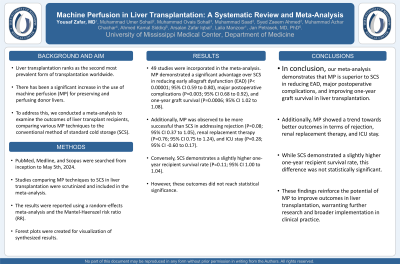Tuesday Poster Session
Category: Liver
P4577 - Machine Perfusion in Liver Transplantation: A Systematic Review and Meta-Analysis
Tuesday, October 29, 2024
10:30 AM - 4:00 PM ET
Location: Exhibit Hall E

Has Audio
- YZ
Yousaf Zafar, MD
University of Mississippi Medical Center
Madison, MS
Presenting Author(s)
Yousaf Zafar, MD1, Muhammad Umer Sohail, 2, Muhammad Ovais Sohail, 3, Muhammad Saad, 2, Syed Zaeem Ahmed, 2, Muhammad Azhar Chachar, 4, Ahmed Kamal Siddiqi, 5, Arsalan Zafar Iqbal, 1, Laila Manzoor, 1, Jan Petrasek, MD, PhD6
1University of Mississippi Medical Center, Madison, MS; 2Dow University of Health Sciences, Madison, MS; 3Conemaugh Memorial Medical Center, Karachi, Sindh, Pakistan; 4Ziauddin University, Madison, MS; 5Emory University Hospital, Atlanta, GA; 6Texas Liver Institute, San Antonio, TX
Introduction: Liver transplantation ranks as the second most prevalent form of transplantation worldwide. There has been a significant increase in the use of machine perfusion (MP) for preserving and perfusing donor livers. To address this, we conducted a meta-analysis to examine the outcomes of liver transplant recipients, comparing various MP techniques to the conventional method of standard cold storage (SCS).
Methods: PubMed, Medline, and Scopus were searched from inception to May 5th, 2024. Studies comparing MP techniques to SCS in liver transplantation were scrutinized and included in the meta-analysis. The results were reported using a random-effects meta-analysis and the Mantel-Haenszel risk ratio (RR). Forest plots were created for visualization of synthesized results.
Results: 49 studies were incorporated in the meta-analysis. MP demonstrated a significant advantage over SCS in reducing early allograft dysfunction (EAD) (P< 0.00001; 95% CI 0.59 to 0.80), major postoperative complications (P=0.003; 95% CI 0.68 to 0.92), and one-year graft survival (P=0.0006; 95% CI 1.02 to 1.08). Additionally, MP was observed to be more successful than SCS in addressing rejection (P=0.08; 95% CI 0.37 to 1.05), renal replacement therapy (P=0.76; 95% CI 0.75 to 1.24), and ICU stay (P=0.28; 95% CI -0.60 to 0.17). Conversely, SCS demonstrates a slightly higher one-year recipient survival rate (P=0.11; 95% CI 1.00 to 1.04). However, these outcomes did not reach statistical significance.
Discussion: In conclusion, our meta-analysis demonstrates that MP is superior to SCS in reducing EAD, major postoperative complications, and improving one-year graft survival in liver transplantation. Additionally, MP showed a trend towards better outcomes in terms of rejection, renal replacement therapy, and ICU stay. While SCS demonstrated a slightly higher one-year recipient survival rate, this difference was not statistically significant. These findings reinforce the potential of MP to improve outcomes in liver transplantation, warranting further research and broader implementation in clinical practice.
Disclosures:
Yousaf Zafar, MD1, Muhammad Umer Sohail, 2, Muhammad Ovais Sohail, 3, Muhammad Saad, 2, Syed Zaeem Ahmed, 2, Muhammad Azhar Chachar, 4, Ahmed Kamal Siddiqi, 5, Arsalan Zafar Iqbal, 1, Laila Manzoor, 1, Jan Petrasek, MD, PhD6. P4577 - Machine Perfusion in Liver Transplantation: A Systematic Review and Meta-Analysis, ACG 2024 Annual Scientific Meeting Abstracts. Philadelphia, PA: American College of Gastroenterology.
1University of Mississippi Medical Center, Madison, MS; 2Dow University of Health Sciences, Madison, MS; 3Conemaugh Memorial Medical Center, Karachi, Sindh, Pakistan; 4Ziauddin University, Madison, MS; 5Emory University Hospital, Atlanta, GA; 6Texas Liver Institute, San Antonio, TX
Introduction: Liver transplantation ranks as the second most prevalent form of transplantation worldwide. There has been a significant increase in the use of machine perfusion (MP) for preserving and perfusing donor livers. To address this, we conducted a meta-analysis to examine the outcomes of liver transplant recipients, comparing various MP techniques to the conventional method of standard cold storage (SCS).
Methods: PubMed, Medline, and Scopus were searched from inception to May 5th, 2024. Studies comparing MP techniques to SCS in liver transplantation were scrutinized and included in the meta-analysis. The results were reported using a random-effects meta-analysis and the Mantel-Haenszel risk ratio (RR). Forest plots were created for visualization of synthesized results.
Results: 49 studies were incorporated in the meta-analysis. MP demonstrated a significant advantage over SCS in reducing early allograft dysfunction (EAD) (P< 0.00001; 95% CI 0.59 to 0.80), major postoperative complications (P=0.003; 95% CI 0.68 to 0.92), and one-year graft survival (P=0.0006; 95% CI 1.02 to 1.08). Additionally, MP was observed to be more successful than SCS in addressing rejection (P=0.08; 95% CI 0.37 to 1.05), renal replacement therapy (P=0.76; 95% CI 0.75 to 1.24), and ICU stay (P=0.28; 95% CI -0.60 to 0.17). Conversely, SCS demonstrates a slightly higher one-year recipient survival rate (P=0.11; 95% CI 1.00 to 1.04). However, these outcomes did not reach statistical significance.
Discussion: In conclusion, our meta-analysis demonstrates that MP is superior to SCS in reducing EAD, major postoperative complications, and improving one-year graft survival in liver transplantation. Additionally, MP showed a trend towards better outcomes in terms of rejection, renal replacement therapy, and ICU stay. While SCS demonstrated a slightly higher one-year recipient survival rate, this difference was not statistically significant. These findings reinforce the potential of MP to improve outcomes in liver transplantation, warranting further research and broader implementation in clinical practice.
Disclosures:
Yousaf Zafar indicated no relevant financial relationships.
Muhammad Umer Sohail indicated no relevant financial relationships.
Muhammad Ovais Sohail indicated no relevant financial relationships.
Muhammad Saad indicated no relevant financial relationships.
Syed Zaeem Ahmed indicated no relevant financial relationships.
Muhammad Azhar Chachar indicated no relevant financial relationships.
Ahmed Kamal Siddiqi indicated no relevant financial relationships.
Arsalan Zafar Iqbal indicated no relevant financial relationships.
Laila Manzoor indicated no relevant financial relationships.
Jan Petrasek indicated no relevant financial relationships.
Yousaf Zafar, MD1, Muhammad Umer Sohail, 2, Muhammad Ovais Sohail, 3, Muhammad Saad, 2, Syed Zaeem Ahmed, 2, Muhammad Azhar Chachar, 4, Ahmed Kamal Siddiqi, 5, Arsalan Zafar Iqbal, 1, Laila Manzoor, 1, Jan Petrasek, MD, PhD6. P4577 - Machine Perfusion in Liver Transplantation: A Systematic Review and Meta-Analysis, ACG 2024 Annual Scientific Meeting Abstracts. Philadelphia, PA: American College of Gastroenterology.

